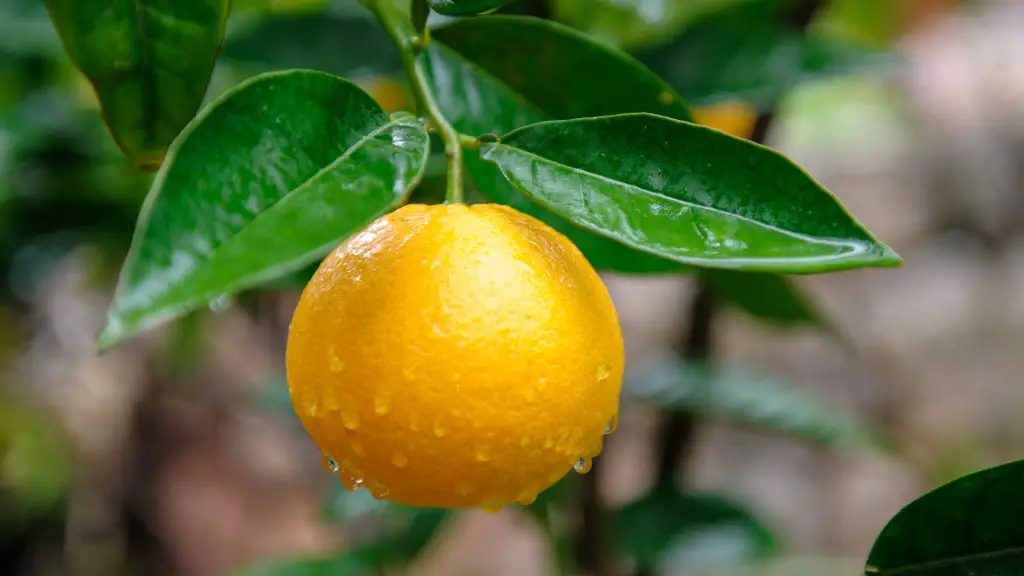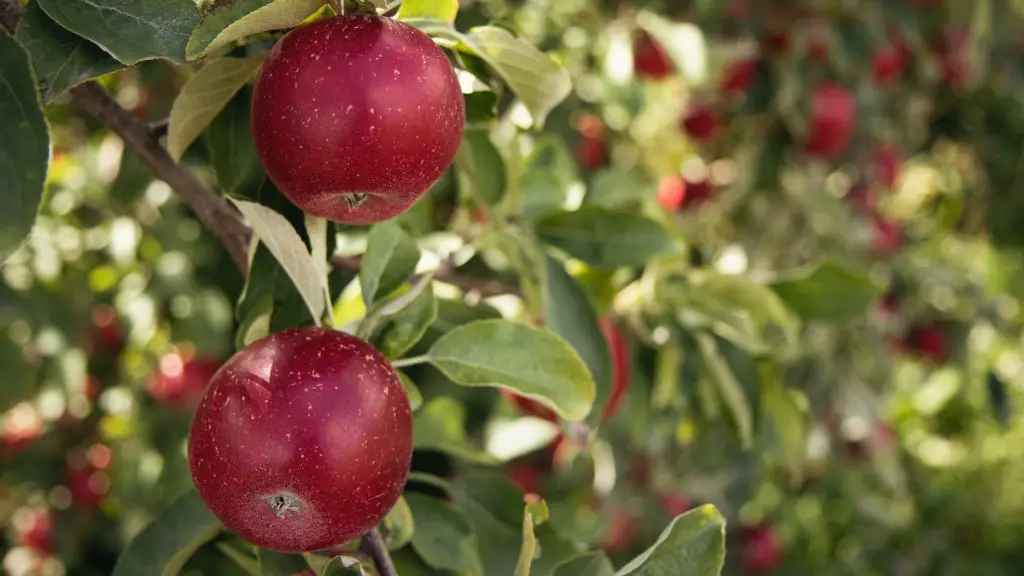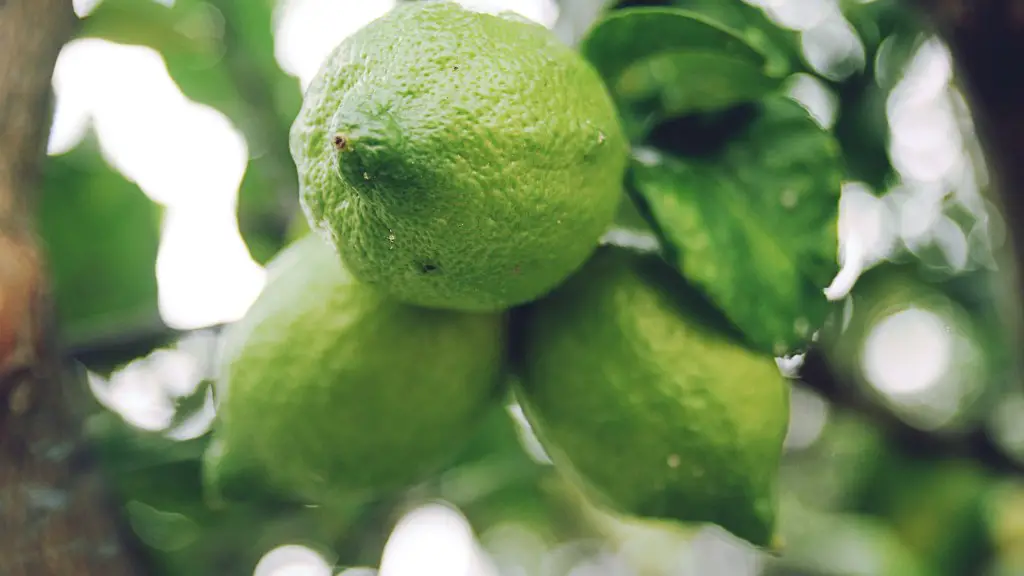It’s uncommon to find hard lemons growing on a live tree, yet it happens. One key reason why lemons may be hard on a tree is due to the lack of pollination among the blooms, leading to a condition known as ‘Poor Fruit Set’. Poor production of baby lemons is often related to lack of pollination – if pollen is not transferred efficiently between blooms, then fertilization can be inadequate.
Often, the problem with poor pollination occurs due to a lack of wild bees, as these are often the main form of pollination for an area. Other reasons may include a high amount of rain leading to lots of fungus, or the use of regional pesticides affecting the pollinating species in the area.
Lack of pollination leads to lemons hardening on the branch, and can indicate potential nutritional problems from the tree, as the lemons may not be ripening properly. A visual assessment of the tree and its lemons is often the first step in determining the underlying cause for hard lemons.
In most cases, the underlying cause may be related to a variance in the nutrition that the tree receives. This can be impacted by a number of factors, such as an imbalance in nutrients, water deficiency, or the excessive use of chemical treatments which may be used on the tree.
Nutritional imbalances, though, may not be the only problem behind hard lemons. Infestation by various bugs and pests, while being difficult to diagnose, can also lead to hard lemons. To prevent any further damage to the tree, it is important to inspect the plant regularly and apply appropriate pest control.
Finally, it is also possible for lemons to be hard for other external causes, such as a major environmental change or fluctuations in temperatures, meaning that the tree does not have enough time to adjust the amount of ripening it can do before the lemon is removed.
Nutritional imbalance
Nutritional imbalances can sometimes mean that the tree is not receiving the correct nutrients it needs, meaning that the fruit produced is of poor quality. If the lemons are not getting enough nitrogen, phosphorus or potassium, it could cause them to remain hard when they should be ripening. To look for nutritional imbalances, a soil analysis is often recommended in order to gain a better understanding of the impact of the underlying cause.
Trees, especially citrus trees, may need to be fed every month or so in order to obtain the correct nutrient levels. For lemon trees, a good standard to follow is to apply a good quality product such as a combination of iron, calcium, and magnesium enriched fertilizer. However, alternatively, it is also possible to utilize compost, which is a much more natural and cost effective method of maintaining the overall nutrient balance of the tree.
In addition, it may result in a reluctance to fruit, and so if the issue is due to a nutritional imbalance, it is important to attend to the deficiency before the tree can start to produce lemons again. The solutions to nutrient deficiency are often short term, yet they can give the tree more time to adjust to possible seasonal changes and can provide the plant with enough energy to start fruit production in the future.
It is important to ensure that the nutrient imbalance problem is corrected in order to prevent any further damage to the tree. When it comes to correcting the nutrient imbalances, it is important to use an application specifically designed for the species of tree, as well as one that is appropriate for the current conditions.
Furthermore, if the nutrient imbalance is persistent and due to a lack of soil fertility, it may be worth considering adding a soil pH enhancer or soil amendment to the soil, as this could be an effective solution for improving the trees natural health.
Environmental Stress
In some cases, an environmental stress can be another major factor for lemons not ripening on a tree. Environmental stress can mean many things, but some examples can include simultaneous days of both high and low temperatures, strong winds and heavy rain, or extreme temperatures/seasons.
When a drastic change occurs in a lemon tree’s natural environment, it may cause the tree not to be able to adjust to the conditions in time and cause the lemons to be left hard on the tree. It is, therefore, important to ensure the tree’s environment is relatively consistent during the growing season to avoid any setbacks.
Perhaps the best way to manage these environmental changes, is to provide the tree with a stable environment by protecting it from extreme weather or temperature changes. If the tree grows in a spot that’s open to any external environmental factor, then it can be moved to a more sheltered spot in order to avoid anything that could impact it.
Even so, if the environmental change is due to seasonality, it is important to ensure the tree is properly fed and protected throughout the year. Supplementing with nutrients can help maintain the strength of the tree and its leaves, and providing the optimal temperature can further aid the rate of ripening.
Lastly, if you plan to change the location of the tree, it is important to ensure the new area is suitable for the lemon tree to grow. A spot with enough sunlight and gentle heat is highly recommended in order to ensure the optimal conditions for growth and ripening.
Humidity
Humidity levels can also be a determining factor for lemon ripening. High humidity levels can cause poor ventilation, which can lead to growth issues, including lemons not ripening on time. Low humidity levels, however, can cause the opposite issues and can cause the fruits to dry out too quickly, which can also lead to lemons hardening prematurely.
If humidity levels are a possible cause for hard lemons, then it is important to take steps to try and regulate them. To reduce the levels, it is recommended to prune the trees and remove any unnecessary branches or leaves. This can help encourage airflow and boost ventilation, which can make the environment more optimal for ripening fruits.
It is also possible to install an irrigation system to the base of the lemon tree. The system can slowly release water in the form of a fine mist, which will help promote humid air around the tree. This can help maintain a more consistent humidity level while simultaneously maintaining the hydration of the tree.
Finally, it may be worth considering moving the lemon tree to a new area. Depending on the region, it can be beneficial to relocate the tree to an area where the climate is more suitable for lemon ripening. For example, an area that has mild, warm climates and a relative humidity level of around 50%.
Disease
In addition to nutritional imbalances, environmental stress and humidity, diseases can also be the cause of hard lemons on the tree. Depending on the type of disease, it is possible to identify them by inspecting the tree and its fruits.
Lemon trees can be prone to fungal and bacterial diseases, such as canker, rot, and blight If a disease is causing the lemons to remain hard on the tree, it is important to treat the plant with a specifically designed fungicide or pesticide that is designed for the specific species.
In most cases, the application of a fungicide or pesticide can aid in reducing the spread of the disease; however, it is important to try and monitor the intensity of the infection in order to catch it early on. If the disease continues, it can lead to the plant’s leaves and fruits turning yellow, or lemons hardening off the tree.
If a fungicide is required, it is crucial to apply it in the form of a spray, as it is the most effective way to reduce the spread of the disease. It is also important to ensure that the fungicide is applied evenly and that the whole tree has been accounted for. Spraying at the base of the trunk can help provide additional protection for the tree.
Sometimes, if a disease has become persistent, then it can be possible to prune away any infected fields and get rid of it in the soil. Removing the infected parts of the tree can help reduce the risk of the spread of the disease, and can help to encourage new and healthy growth.
Conclusion
Having hard lemons on a tree can sometimes be a sign that there is something wrong with the tree. By assessing the tree and its condition, it is possible to gain an understanding as to why the lemons are hard on the tree and what can be done to remedy it. The underlying causes for lemons hardening can include a lack of pollination, a nutritional imbalance, environmental stress and humidity, and a potential disease.




